Fischer Award
Richard Fischer Environmental Conservation Award
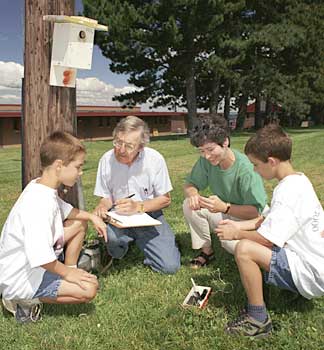
This award is named in honor of the late Richard B. Fischer, who, throughout his decades of residence in the Town of Ithaca, undertook by teaching and example to improve the quality of the natural environment within the Town, Tompkins County, and the State of New York.
As an educator, Dr. Fischer taught generations of Cornell University students the precepts and practice of environmental conservation through courses such as Environmental Writing and Field Natural History. As a writer of hundreds of scientific and popular articles, he informed and engaged the interest of his peers in the field of conservation, and members of the general public of all ages, in a wide range of conservation-related topics. As a naturalist, Dr. Fischer undertook such projects as the provision and monitoring of scores of Eastern bluebird nesting boxes in appropriate habitat throughout the Town, in order to encourage re-establishment of a viable population of the beautiful State Bird of New York for the enjoyment of generations of Town residents. As a public citizen, he led the successful campaign to enact State legislation which mandates beverage container deposit returns, thereby reducing litter in the environment throughout the State.
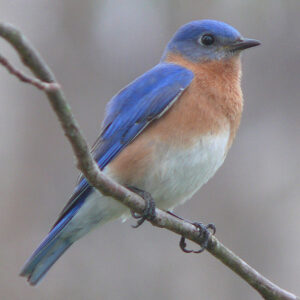
In recognition of Dr. Fischer’s untiring and effective lifelong efforts to promote environmental awareness and action, at both the personal and the societal levels, the Richard B. Fischer Annual Environmental Conservation Recognition Award was established in 2003, to be given to recipients demonstrating Dr. Fischer’s exemplary dedication to environmental conservation.
Award Winners
2022 – Friendship Donations Network
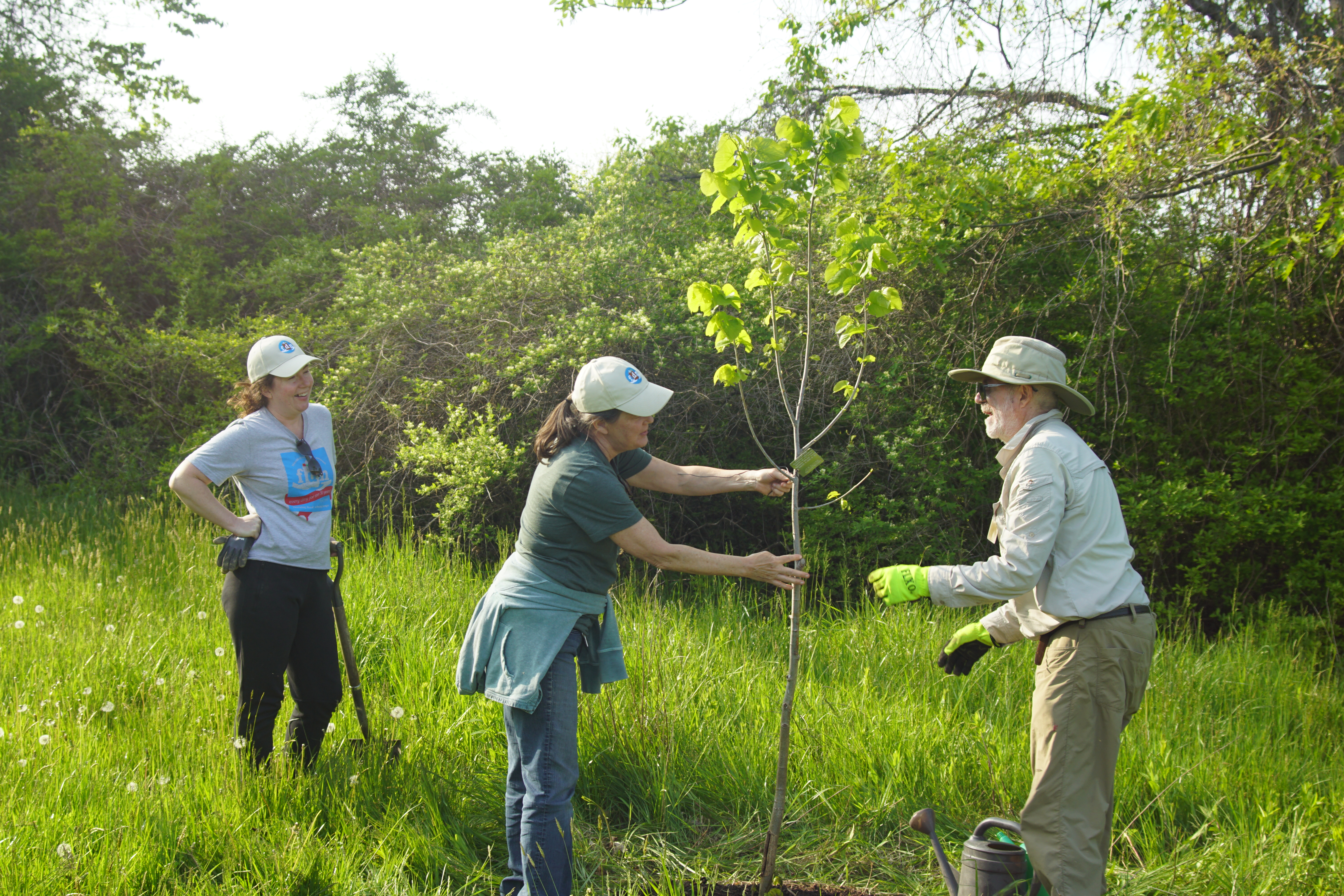
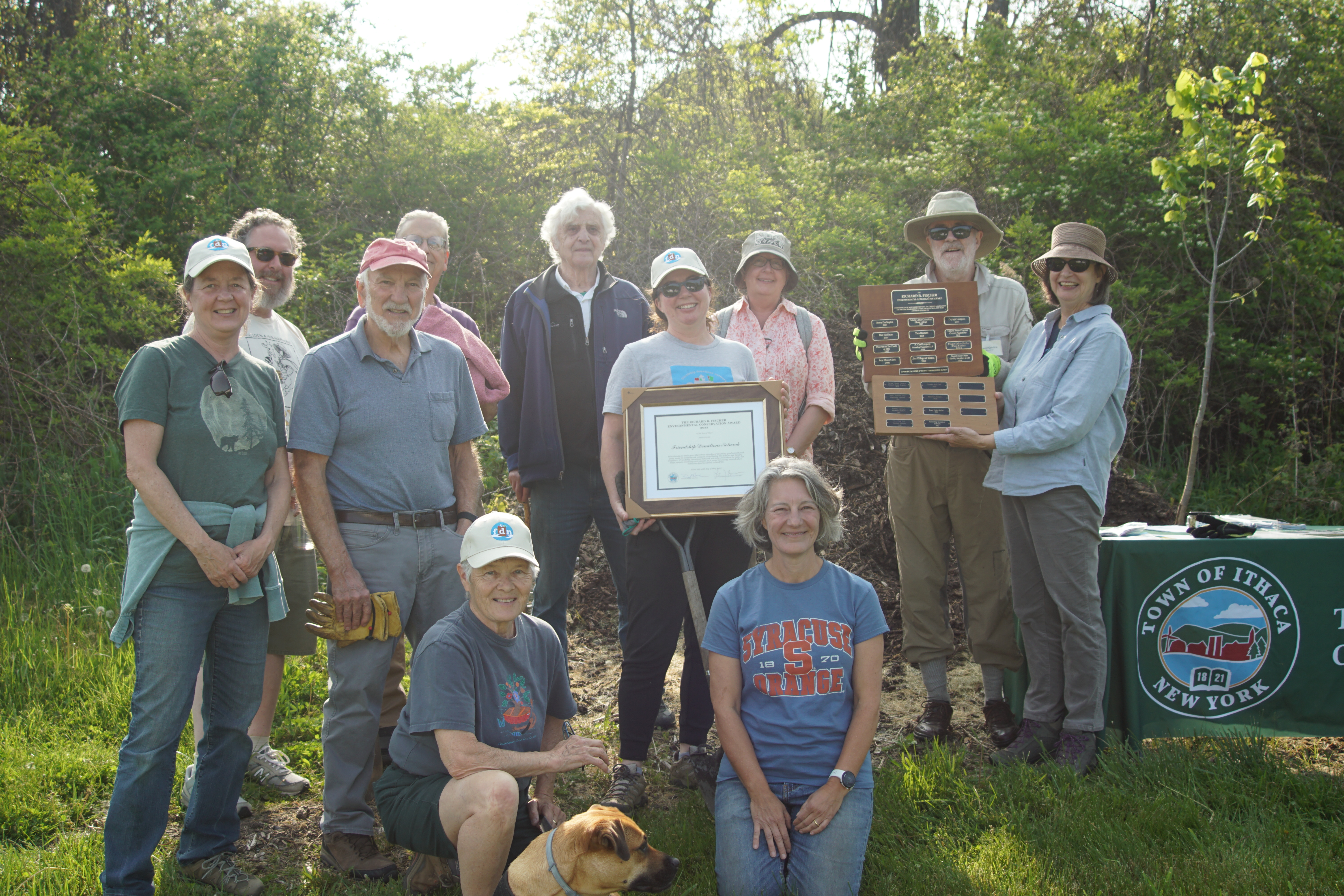
The Friendship Donations Network (FDN) helped us plant three basswood trees (Tilia americana) in honor of being awarded the 2022 Fischer Award. For 35 years, FDN has rescued food, preventing healthy nutrition from being wasted, and bringing it to hungry neighbors. These trees found a new home near the West Hill Community Garden where basswood shade wouldn’t reach the garden, while basswood flowers can help feed pollinators. We all drank some iced basswood tea in the same park where the 9th Fischer Award tree, a Honeycrisp apple, was planted to honor Cayuga Compost’s winning the 2011 award.
2021 – Finger Lakes ReUse
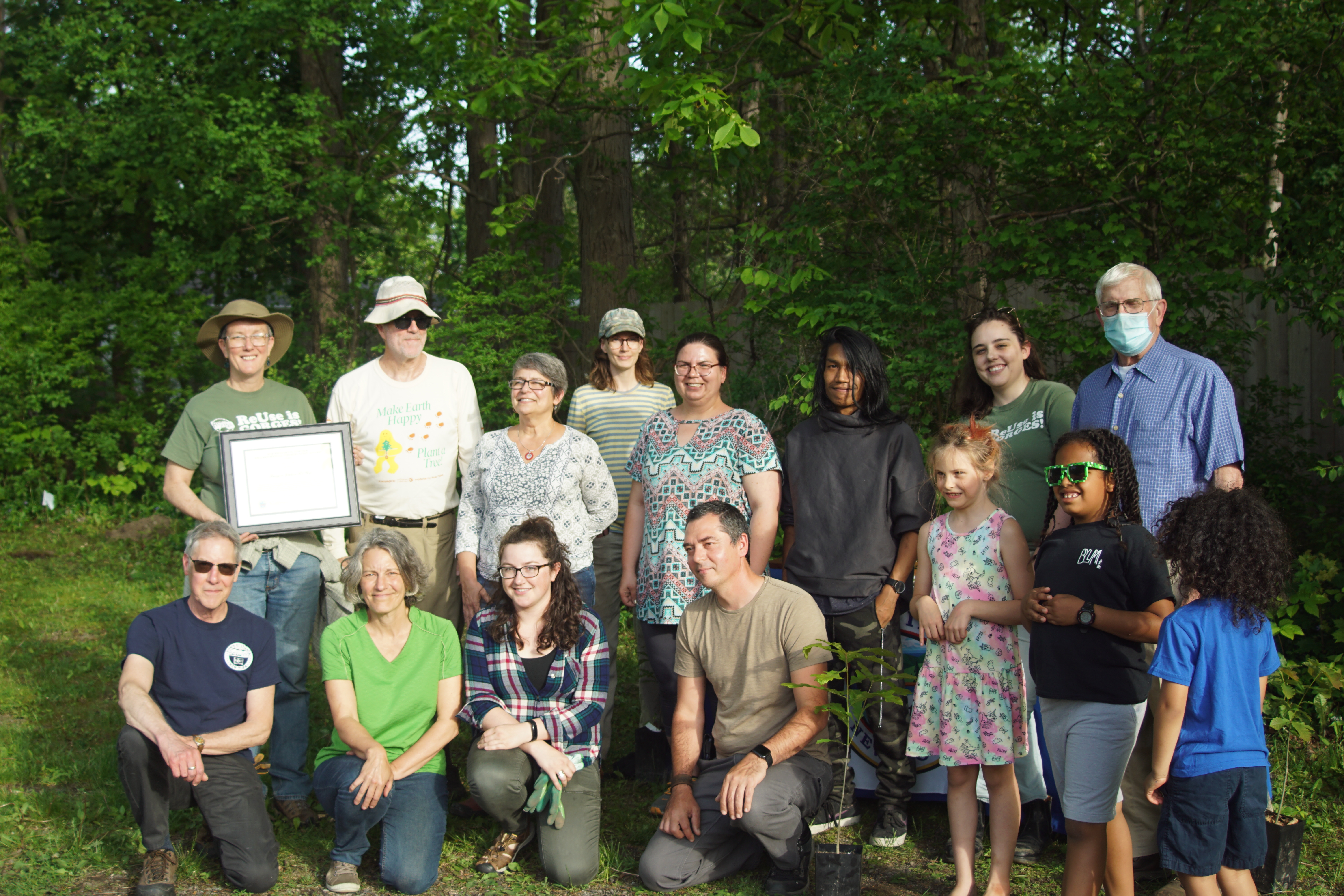
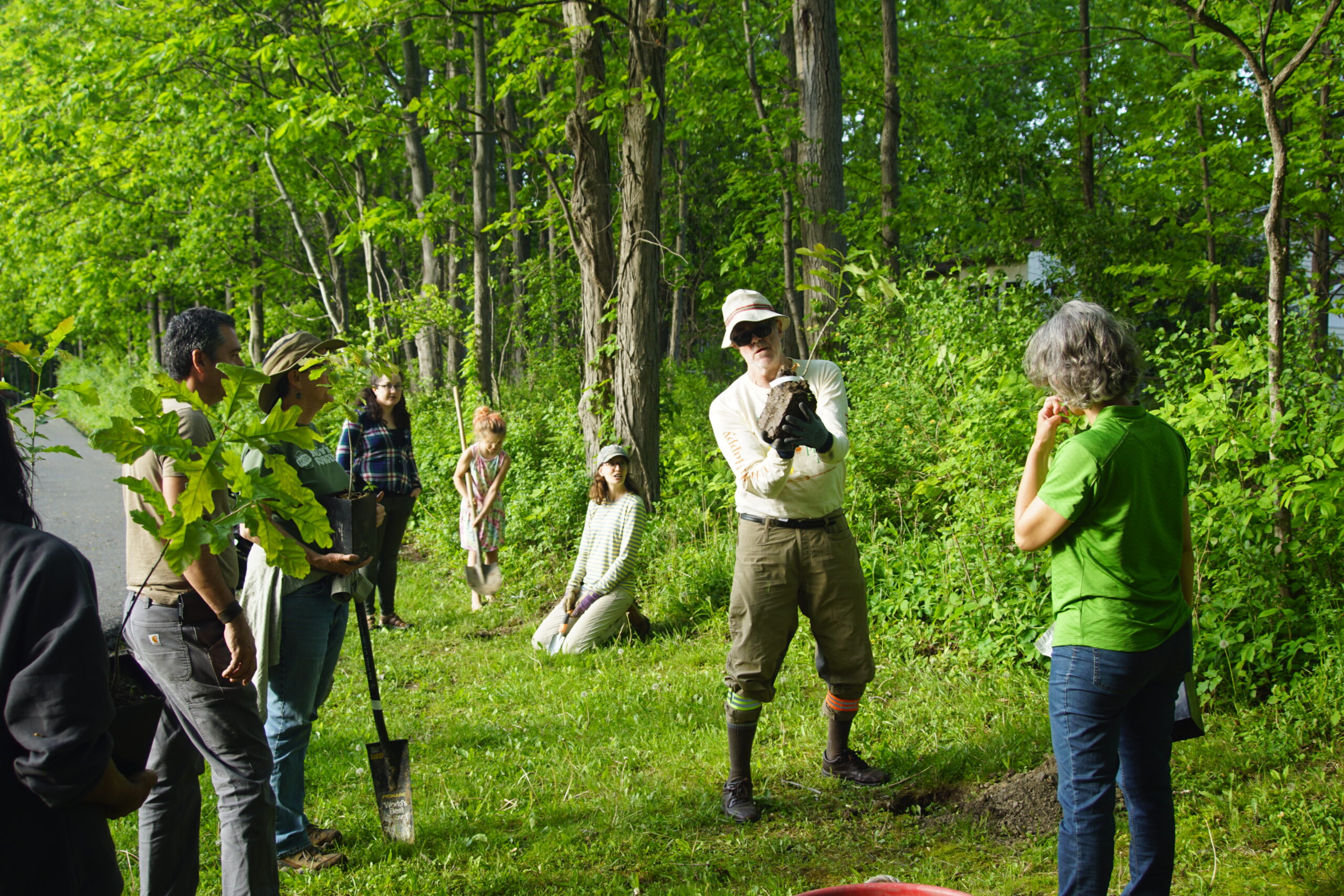
Members of the Conservation Board presented the award to representatives of Finger Lakes ReUse at a tree planting ceremony at the Town of Ithaca’s Tareyton Park. The group planted 4 Bur Oaks in one corner of the park along the Northeast Ithaca Recreation Way. Finger Lakes ReUse was honored for their years of hard work, dedicated to conserving useful materials and promoting the reuse of tons of valuable items that might otherwise be wasted in landfills.
2020 – Primitive Pursuits
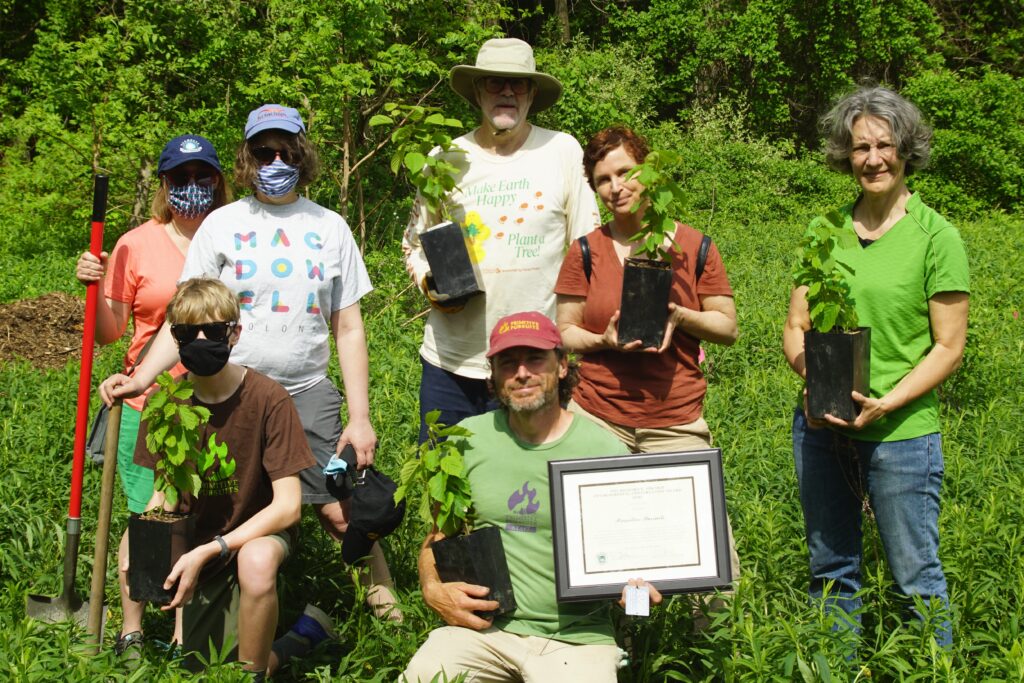
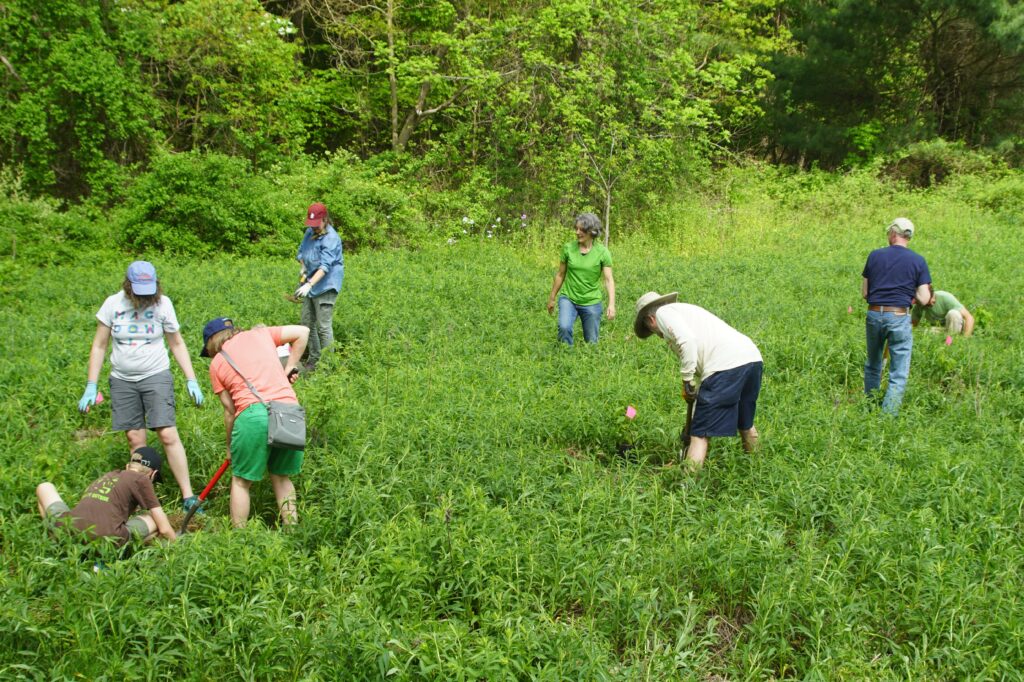
A happy party of tree-huggers celebrated Primitive Pursuit’s winning the 18th annual Fischer award at the Town’s new Culver Road Preserve. A flat meadow at 1,000 feet above sea level just south of Coy Glen offered space for a dozen young native American hazelnut seedlings. The Howard gravelly loam there, about half rocks, made the digging quite a challenge! But Primitive Pursuits knows how to improve our natural land, by hand, one plant at a time. As Jed Jordan (Primitive Pursuits Co-Director) noted, like hazelnuts, people need a community to become productive in the natural world.
2019 – Cayuga Bird Club
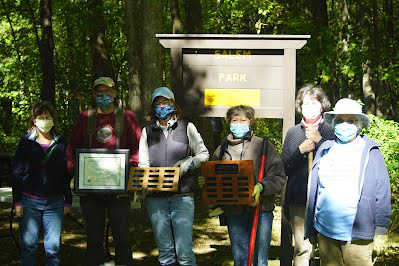
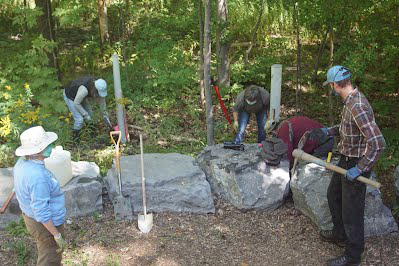
Carefully following COVID-19 safety measures, on September 20, 2020 a select group of Town of Ithaca conservationists met with Cayuga Bird Club members to celebrate their winning the 2019 Fisher Award by planting a dozen native amalanchier seedlings around the playground in Salem Park. Adjacent to Sapsucker Woods and Cornell’s Laboratory of Ornithology, this site was chosen to provide tasty juneberries for Ithaca’s birds. The Bird Club won the Fischer Award for the ongoing work their Conservation Action Committee has done removing invasive species and planting native flora to improve bird habitat on Lighthouse Point.
2018 – New York State Hemlock Initiative
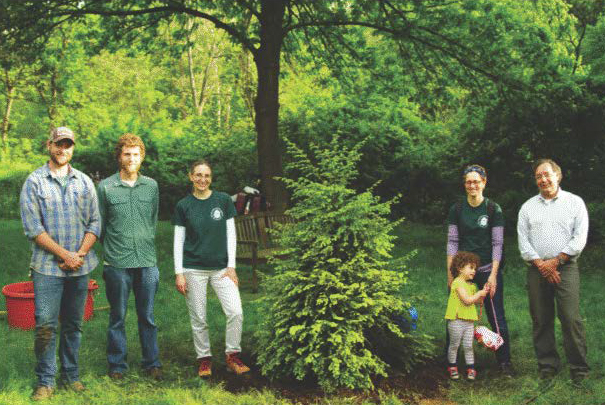
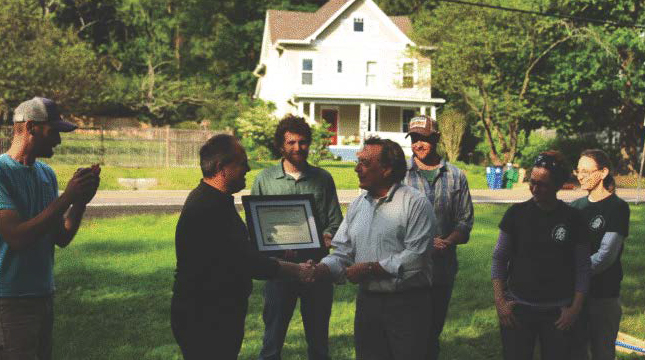
We had a fitting tree-planting ceremony to honor the NYS Hemlock Initiative {NYSHI) on May 28th by planting an Eastern Hemlock tree within the Town of Ithaca’s Forest Home Park. Many members of the Conservation Board, the NYSHI 11-member team and the community were in attendance.
2017 – Tony Ingraham and Liz Bauman
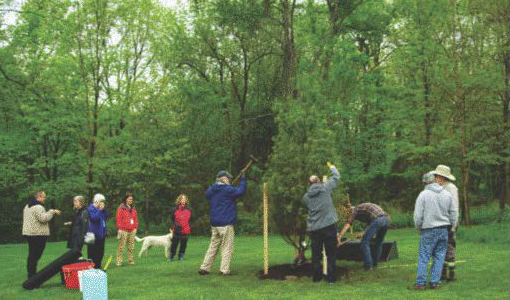
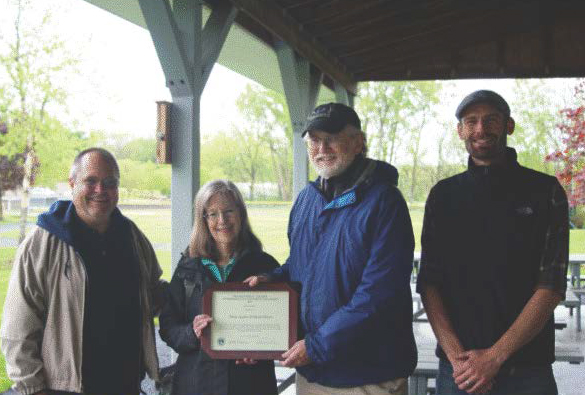
Surrounded by enthusiastic tree planters, Town of Ithaca Supervisor Bill Goodman presented Tony Ingraham and Liz Bauman with the 2017 Richard B. Fischer Environmental Conservation Award. A white pine was planted in one of Tony and Liz’s favorite parks, Tutelo Park. Tony and Liz have spent many years supporting the natural world surrounding Ithaca and continued that support just this year by participating in and documenting the Town of Ithaca Conservation Boards 2018 Invasive Species week event at the very same park.
2016 – Black Diamond Trail Enthusiasts Network
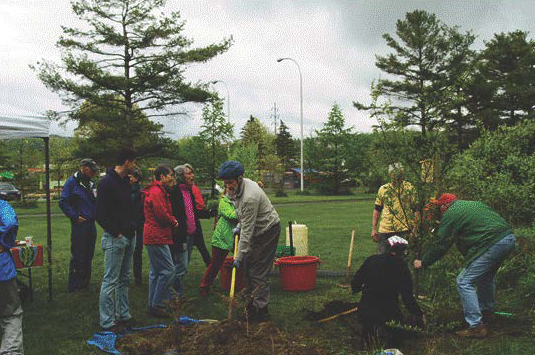
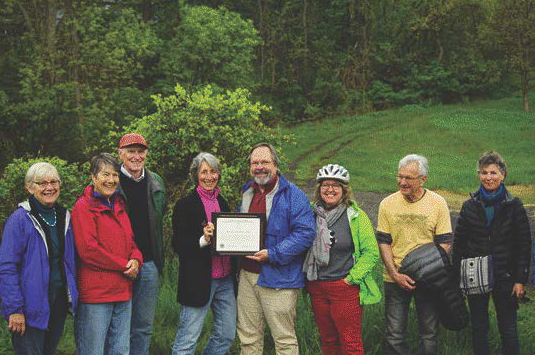
The Black Diamond Enthusiasts Network, aka BDTEN, was well represented at a beautiful cool Ithaca morning’s Fischer Award Tree planting party. Perfect transplanting weather! Happy Enthusiastic Tree-hugging crowd! An American hornbeam, aka Carpinus caroliniana, was glad to get moved from our favorite native tree nursery on a Canandaigua Lake hillside to the Cass Park trailhead of the beautiful Phase One trailhead of the Black Diamond Trail.
All present agree it’s time to get moving on Phase Two (connecting Allan H. Treman/Cass Park to Buttermilk Falls)! Please see https://blackdiamondtrail.org/the-plan/ , where you can find hyperlinks to the complete master plan from the NYS Office of Parks, Recreation, and Historic Preservation. Then join the BDTEN to keep pushing for more wonderful gorgeous trail!
2015 – Cayuga Nature Center Summer Camp Program
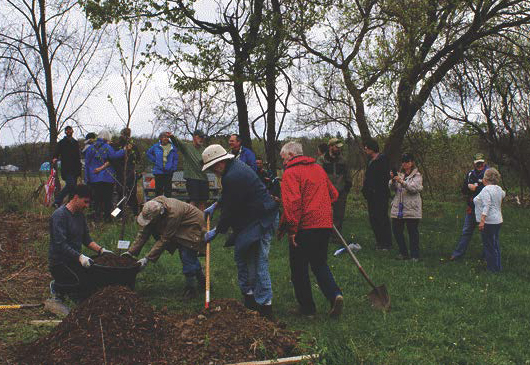
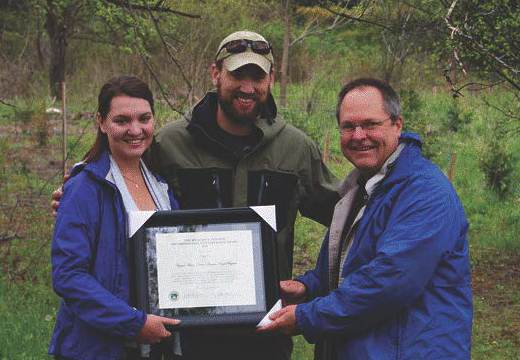
Dayna Jorgenson (Environmental Education Manager and head of the Cayuga Nature Center Summer Camp) and Matt Sacco (Director of Programs) received a certificate for the award from Town Supervisor Bill Goodman. Planted in their honor, along the East Ithaca Recreation Way, a tulip tree commemorates their 30 years of teaching Ithaca children the importance of conserving nature.
2014 – The Six Mile Creek Water Quality Monitor Volunteers
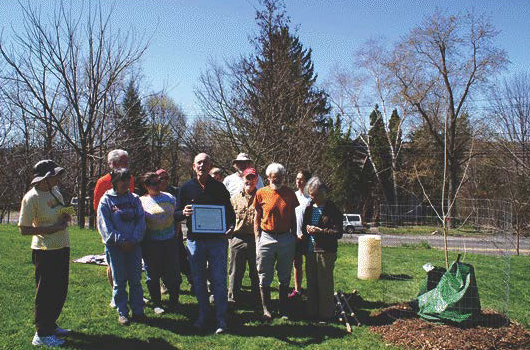
Twenty-one happy tree-huggers attended the 12th annual Fischer Award ceremony, where they planted an eight-foot tall sycamore tree in Grandview Park, uphill of the thirty-foot dam on Six Mile Creek. The Six Mile Creek Water Quality Monitor Volunteers at the Community Science Institute were honored for their ten years of continuous water sampling, collecting both benthic macroinvertebrates for biological analyses, and water samples for chemical examination, which establish scientific and certified proof of the health of this important watershed in the Town.
2013 – The Finger Lakes Native Plant Society
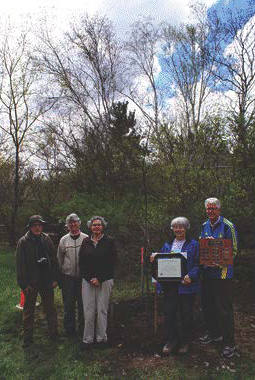
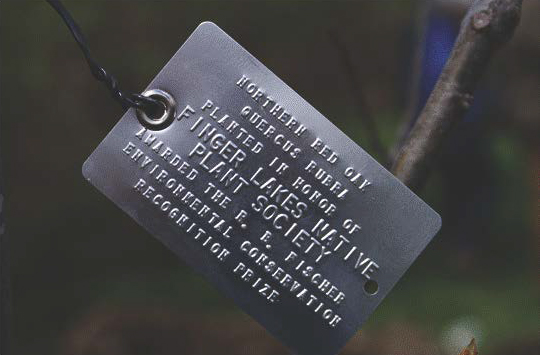
The award was established by the Town of Ithaca Conservation Board to honor Dr. Fischer for his significant efforts to preserve important environmental resources in the Town. Members of the Conservation Board and the Town Supervisor presented the award to representatives of the Finger Lakes Native Plant Society at a tree planting ceremony on May4, 2014 along the South Hill Recreation Way near the Juniper Drive trail entrance. The Finger Lakes Native Plant Society is being honored for their active contribution to the improvement of the Town of Ithaca’s natural environment.
The FLNPS is primarily an education discovered organization, with programs for experts and those who have just discovered native flora. The organize talks, public field trips, and other activities related to conservation of native plant and their habitats. They also organize education and activities on threats to our native flora, including invasive plants and insects and their control. The FLNPS encourages the use of ethically propagated native plants in private and public gardens and holds an annual native plant sale.
2012 – Cornell Plantations Natural Areas Program
Cornell Plantations Natural Areas Program is the recipient of the tenth annual Richard B. Fischer Environmental Conservation Award.
Members of the Conservation Board presented the award to representatives of the Cornell Plantations Natural Areas Program at a tree planting ceremony on May, 11, 2013, along the East Ithaca Recreation Way, approximately half way between the Game Farm Road and Maple Avenue trailheads, across from the McDaniel’s Nut Grove Kiosk.
Cornell Plantations Natural Areas Program is being honored for their active contribution to the improvement of the Town of Ithaca’s natural environment. They are stewards of more than 3,400 acres of biologically important sites throughout the Fingers Lakes Region. Within the Town of Ithaca, Plantations protects and manages nearly 600 acres of natural areas, including Bluegrass Lane, Coy Glen, Lick Brook, Mitchell Street Hawthorn Thicket, Steep Hollow Creek, South Hill Swamp, and Upper Cascadilla Creek. Their commitment to sustainability, continuous work maintaining recreational access to nature, and dedication to teaching citizens about nature stewardship in and around Ithaca make us really glad to have them in our neighborhood.
2011 – Cayuga Compost
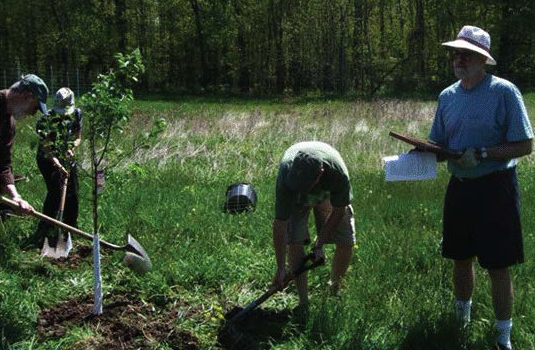
Cayuga Compost, a Ulysses company owned by Jim and Mary Proctor, and managed by Mark Wittig, who started the composting operation at Cayuga Nature Center, has won the Fischer Award for its extensive service to the Town of Ithaca’s schools, hospital, and residents. Not only does Cayuga Compost divert many tons of food waste from landfill; they convert this resource into a valuable and affordable gardening treasure.
2010 – EcoVillage at Ithaca
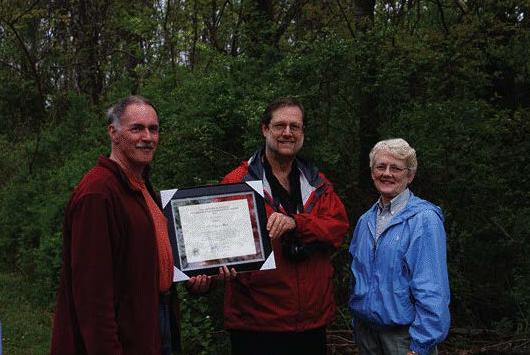
The Richard B. Fischer Environmental Conservation Award for 2010 was given to EcoVillage at Ithaca in honor of their active and continuing contribution to the improvement of the Town’s natural environment, as they model ecologically sustainable living that saves land and energy, promotes local organic food production, and proves this comfortable Ithacan way of life can conserve the long term health of our Earth.
Members of the Town of Ithaca Conservation Board presented the award to EcoVillage at Ithaca at a tree planting ceremony held on May 14, 2011 at the Town of Ithaca’s Westhaven Preserve, located at the end of Helen’s Way.
2009 – A. Carl Leopold
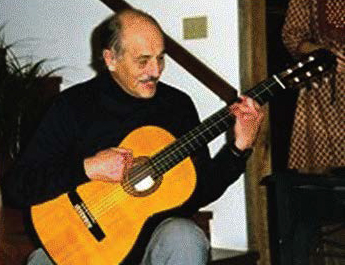
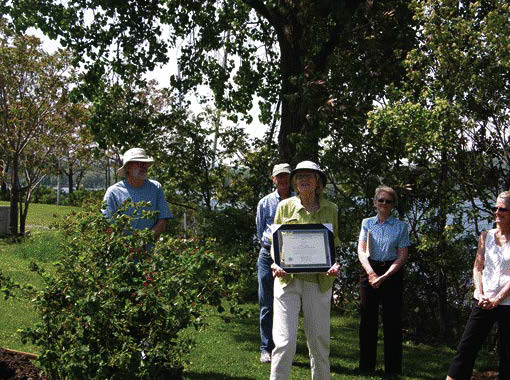
A. Carl Leopold, founding president of the Finger Lakes Land Trust, is the recipient of the seventh annual Richard B. Fischer Environmental Conservation Award. The award was established by the Town of Ithaca Conservation Board to honor Dr. Fischer for his significant efforts to preserve important environmental resources in the Town.
Carl Leopold is being honored for his lasting contribution to the preservation of natural areas in and around the Town of Ithaca. His clear and ethical vision of the importance of a healthy watershed has left Ithaca a better place, especially in the Sweedler Preserve at Lick Brook, and the conservation easements along Six Mile Creek.
At a Tree Planting Ceremony on May 22, 2010, at East Shore Park, Town Supervisor, Herb Engman, and members of the Conservation Board presented the award to Lynn Leopold.
A serviceberry tree was planted, and it holds a metal tag explaining that it was planted in Carl’s memory.
2008 – Tom Reimers
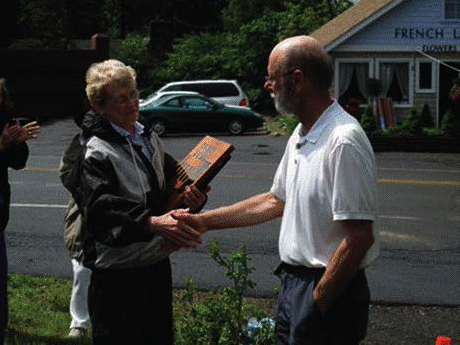
Tom Reimers is the recipient of the sixth annual Richard B. Fischer Environmental Conservation Award. Tom is being honored for his many years of volunteer work with the Cayuga Trails Club, the Finger Lakes Trail Conference, the North County Trail Association and the Finger Lakes Land Trust. Connecting lthacans to natural areas in and around our town, by both words and deeds, as editor, administrator, teacher and avid hiker, Tom has blazed a path through open spaces and undeveloped lands, leading us to appreciate and to preserve them.
A tree planting ceremony to honor Tom Reimers was held on May 29, 2009 at the Mitchell Street entrance to the East Hill Recreation Way in the Town of Ithaca. An Autumn Brilliance Serviceberry tree was planted, while Tom’s accomplishments were recognized in the presence of his many friends, colleagues and neighbors. The tree holds a metal tag explaining that it was planted in honor of Tom. The R. B. Fischer Award plaque, located in the lobby of Town Hall, also bears his name.
2007 – The Ithaca College Natural Lands Committee
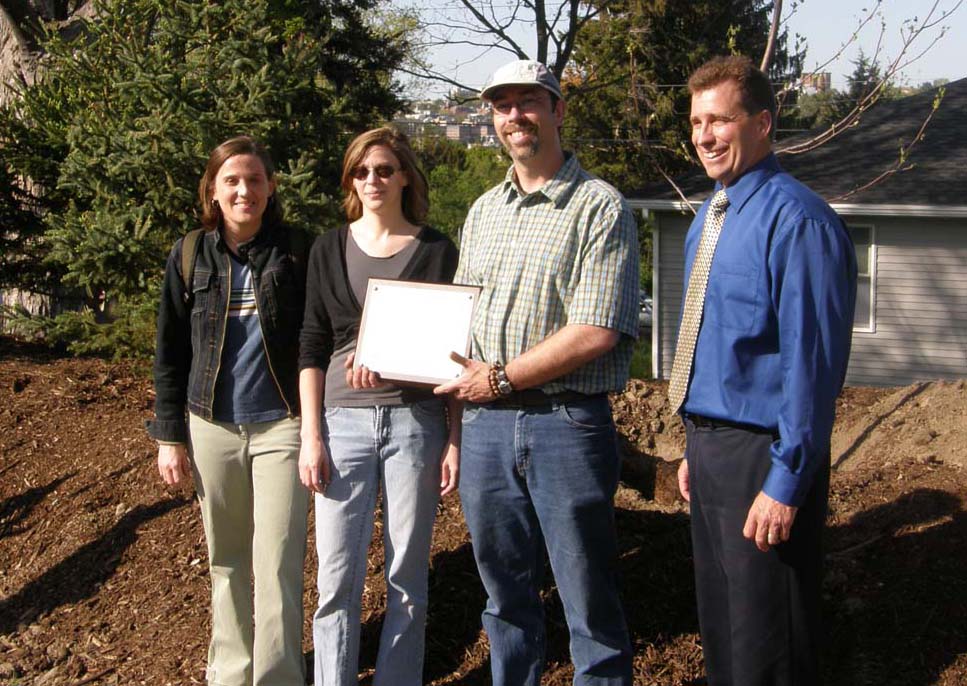
The Ithaca College Natural Lands Committee is the recipient of the fifth annual Richard B. Fischer Environmental Conservation Award.
The Ithaca College Natural Lands Committee (ICNL Committee) was selected to receive this award to recognize their initiative to sustainably manage and protect biologically rich properties owned by Ithaca College. The ICNL Committee members represent a broad array of college faculty, staff, administration, and students. The ICNL Committee was formed three years ago in response to a proposed logging plan on the College’s natural lands. The Committee utilizes the college-owned properties as a teaching resource, not only for students but also for the community through interpretive walks and proposed self-guided trails.
A tree planting ceremony to honor the ICNL was held on May 13, 2008 at the Coddington Road entrance to the South Hill Recreation Way in the Town of Ithaca. The Tulip tree was planted along the popular town trail with help from ICNL and Conservation Board members. The tree holds a metal tag explaining that it was planted in honor of ICNL, and the R. B. Fischer Award plaque, located in the lobby of Town Hall, also bears their name.
Previous Years Award Winners
Previous years award winners:
– Jane Moon Clark, 2006
– Museum of the Earth at PRI, 2005
– Dan Hoffman, 2004
– Betsy Darlington, 2003
Nomination Information
Nominee Eligibility
Nominees for the annual award may be individuals or groups, including but not limited to professional, governmental, and commercial entities. It is desirable, but not necessary, that nominees reside in or be based in the Town of Ithaca. Nominees shall, within the year or longer period preceding the year of their nomination, have completed, or made substantial progress toward completion of, a project or other activity contributing to the improvement of the Town’s natural environment.
Project/Activity Eligibility
Any action which has or will have beneficial effect on the Town’s natural environment will qualify a nominee for consideration for this award. Actions may be physical improvements, or other activities such as, but not limited to, enhancing environmental awareness, environmental education, promotion of environmentally sensitive practices, or effective enforcement of regulations benefiting the environment.
Nominator Eligibility
Any person or entity with knowledge of an eligible project or activity may make a nomination.
Nomination Requirements
Nominations may be made in writing using the form below, addressed to the Town of Ithaca Conservation Board, 215 N. Tioga Street, Ithaca, NY 14850. Electronic submissions will also be welcome via email to conservationboard@town.ithaca.ny.us. Nominations may be submitted at any time during the calendar year for which they are to be considered, but not later than February 28th of the year following. Nominations should identify and provide contact information for the nominee, as well as information describing the project or action which prompts the nomination. Copies of any available supplemental information — news articles, photos, project specifications, publications, school reports, etc. — will be helpful to the Board. Nominators may wish to review the criteria for selecting awardees (see below) in preparing nominations. Nominators should also provide their contact information, in case the Board needs to reach them. Nomination materials will be returned on request, after the Board has made the award determination. Nominators will be informed of the result of the Conservation Board’s consideration of their nomination.
Richard Fischer Award Nomination Form
The Award
The Award will consist of an appropriately worded framed certificate, or other suitable means of recognition, at the discretion of the Conservation Board. More than one award may be given in any year. Presentation will be made at a time and place agreed to by the awardee.
Awardee Selection Process
Each February, the Conservation Board will review all nominations received in the preceding calendar year. In selecting awardees, the Board will consider the following criteria:
Nature/type of project or action. Does it involve physical change to the property? Or other action such as public information, education, or research?
Scope, locus, and orientation of project/action. What size physical area and/or audience does it directly affect? What is its ultimate/intended potential scope? If a physical area affected lies partially outside the Town boundaries, is a significant portion of the affected area within the Town? If it does not involve change to property, are its initial aims to provide Town-wide benefits, or focused more specifically?
Cost-effectiveness. Does it achieve much for little expense?
Applicability. Are the action’s effects easily reproduced, or do they lend themselves to widespread use? Are they likely to encourage other actions to benefit the Town environment?
Visibility/public awareness. If project involves physical change to property, how obvious and visible is it? If a non-physical action, how has the general public been made aware of it?
Impact on the Town of Ithaca. Does the project/action enhance the Town of Ithaca’s public image? Does it present potential for Town government to take steps to benefit the environment?
Type of positive benefit. These might include preservation of a valuable resource, or restoration/enlargement of one; removal/reduction of negative conditions; creation of habitat to benefit rare/threatened/endangered species; creation of a visual enhancement that will benefit an area or the Town as a whole; written and/or graphic material that will educate and inspire Town residents.
Negative effects. Are there offsetting negative outcomes? Could/should these have been foreseen and possibly avoided or reduced? Do they outweigh the benefits?
The Conservation Board will use its best judgment to determine which, if any, nominees meet the criteria, and to what extent, and whether any merit the Award. At its regular March meeting, the Board will formally act on its determinations. Award certificates will be presented as soon thereafter as practicable and agreeable to awardees.